Female shepherds in the Bible, often overlooked, have molded biblical history with their extraordinary faith and resilience – discover their untold stories.
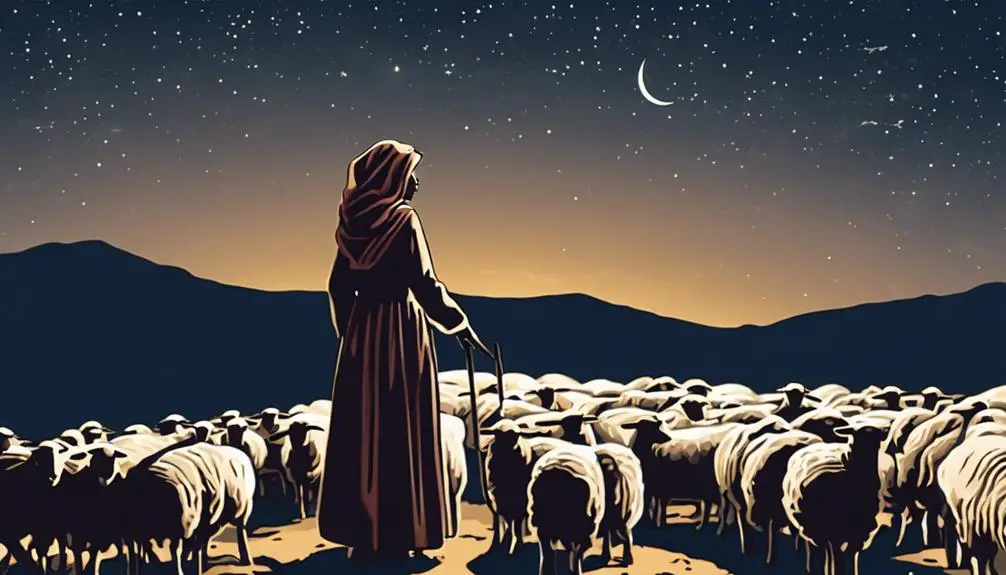
Female Shepherds in the Bible
Did you know that only a fraction of the shepherds mentioned in the Bible are women? Yet, these women play pivotal roles in some of the most transformative narratives.
One such woman, Rachel, is perhaps best known. As you explore this topic, you'll uncover how these women, often overlooked, demonstrate remarkable faith and resilience, shaping biblical history in unexpected ways.
What surprises might you find?
Key Takeaways
- Female shepherds like Rachel and Zipporah played pivotal roles in biblical narratives, demonstrating resilience and courage.
- They challenged traditional gender norms, contributing to gender equality and women empowerment.
- Their stories of overcoming societal and familial challenges serve as enduring symbols of women's strength.
- Through their unwavering faith and determination, they teach lessons of spiritual endurance and faith in action.
The Role of Female Shepherds
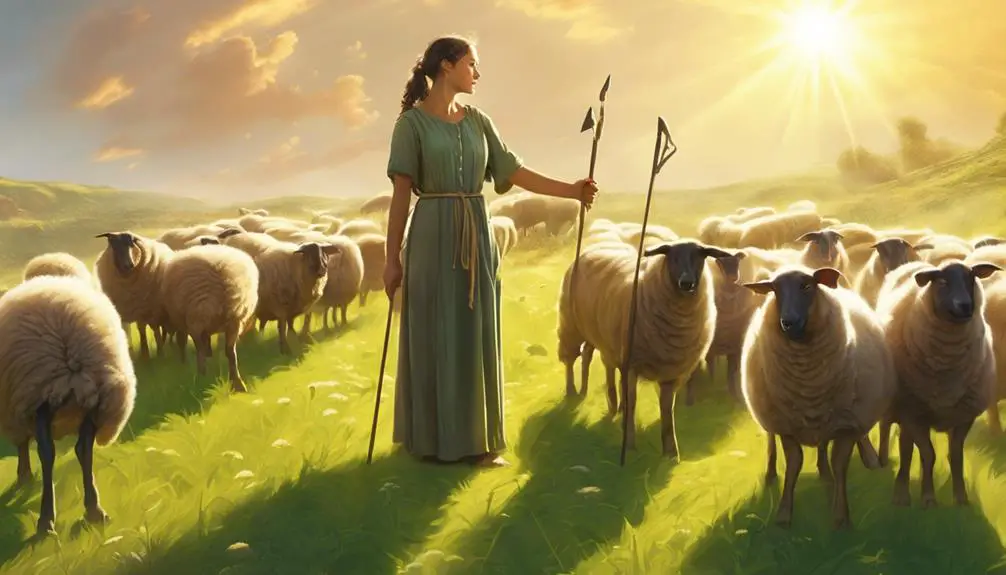
In understanding the biblical narrative, one must take into account the crucial roles that female shepherds played, often demonstrating resilience, courage, and spiritual leadership in their communities. These shepherdesses weren't mere background characters; they were key figures who undeniably influenced the course of biblical history.
Through their roles, they challenged the societal norms of their time, ushering in an era of gender equality that's often overlooked. The shepherdess leadership was a testament to their capacities to lead, shoulder responsibilities, and make significant contributions to their communities.
These women weren't only physical shepherds, tending to the needs of their flocks, but also spiritual shepherds. They guided their people with wisdom and faith, oftentimes serving as intermediaries between God and their communities. Even in scenarios where they faced adversity, they demonstrated resilience and courage, embodying the qualities of true leaders.
The role of the shepherdess in the Bible shouldn't be underestimated. It's a role that exemplifies leadership, resilience, and courage. It's a role that challenges gender norms and promotes equality. It's a role that's instrumental in shaping the biblical narrative as we know it today.
Notable Biblical Female Shepherds
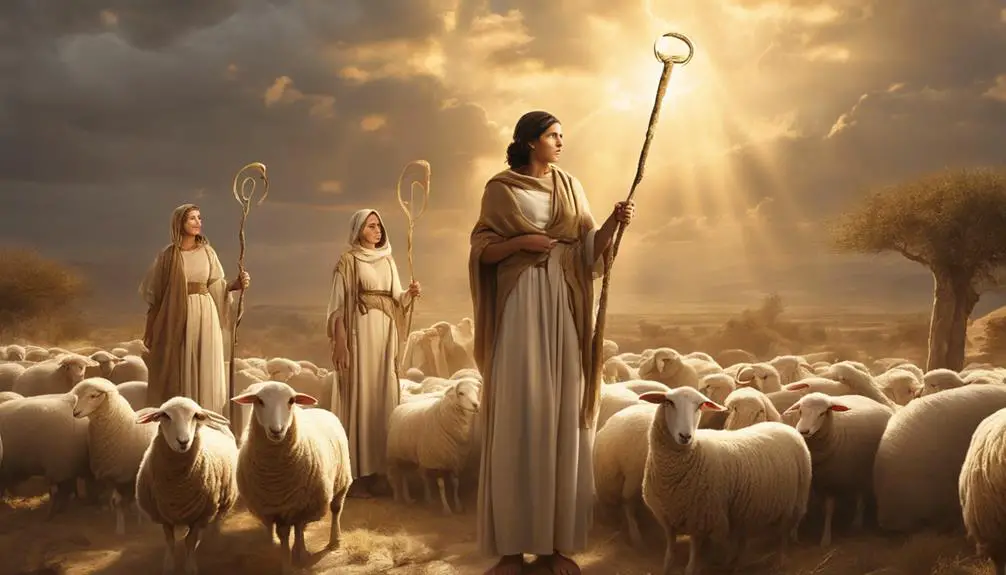
Several female shepherds emerge from the pages of the Bible, each leaving a unique and transformative footprint on biblical history. Their stories, bursting with shepherdess symbolism, provide significant insights into women's empowerment in biblical times.
Rachel and Zipporah, two notable shepherdesses, showcase strength and determination. Rachel's story is a testament to her resilience, whereas Zipporah's narrative showcases her quick thinking and resourcefulness. Both women, by virtue of their roles as shepherdesses, symbolize nurturing, protection, and guidance. These women not only reared flocks, but also navigated societal and familial challenges, embodying true women empowerment.
Biblical Female Shepard |
Notable Qualities |
|---|---|
Rachel |
Resilience |
Zipporah |
Resourcefulness |
Analyzing the symbolism associated with these shepherdesses, one can't ignore their role as caretakers and providers. They were not merely followers, but leaders in their own right. They epitomize the strength of biblical women, and their narratives serve as enduring symbols of women's empowerment. Their stories, as shepherds and women, are etched in biblical history, highlighting the significance of the shepherdess role in amplifying female voices in sacred text.
Overcoming Challenges: Their Stories
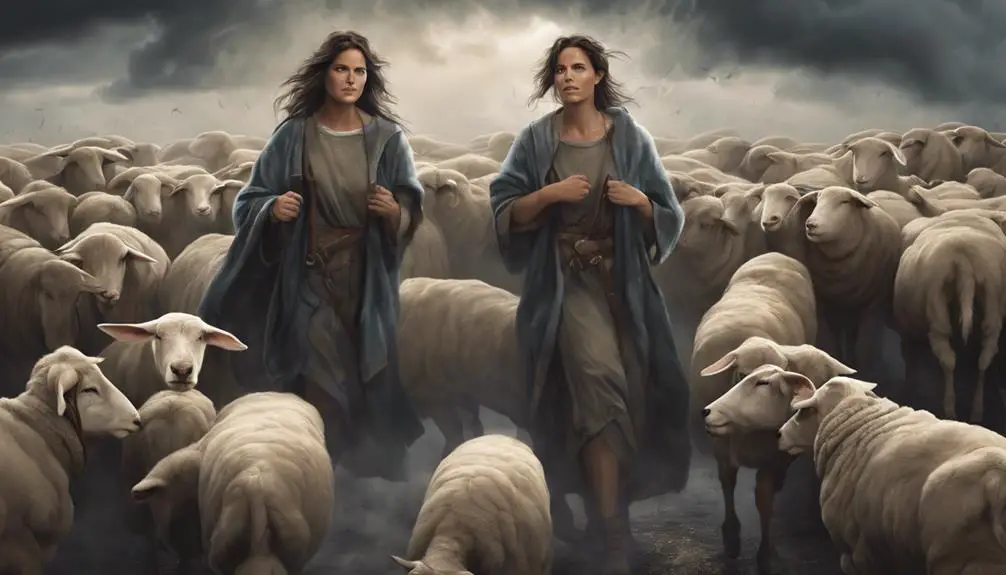
Let's delve into the lives of these biblical shepherdesses and explore how they overcame hurdles, their narratives brimming with lessons of courage, resilience, and resourcefulness. Their stories aren't just personal triumphs, but also illuminate the broader gender dynamics and cultural implications of their era.
Take, for example, Rachel, who, despite societal constraints, demonstrated resourcefulness in managing her father's flock. This, in itself, was a defying act that challenged the gender dynamics prevalent in patriarchal societies, shedding light on the cultural implications of women taking on roles typically reserved for men.
Then there's Zipporah, Moses' wife, whose quick thinking and determination saved her husband from divine wrath. Her story isn't only an account of personal bravery, but also a testament to women's critical roles in religious narratives, challenging the normative gender roles of the time.
These shepherdesses' stories are a poignant reminder of their resilience against the challenges imposed by society and their own circumstances. Their narratives continue to empower and inspire, serving as a testament to the strength of women – not just in biblical times, but also in the present day.
Faith and Determination: Lessons Learned
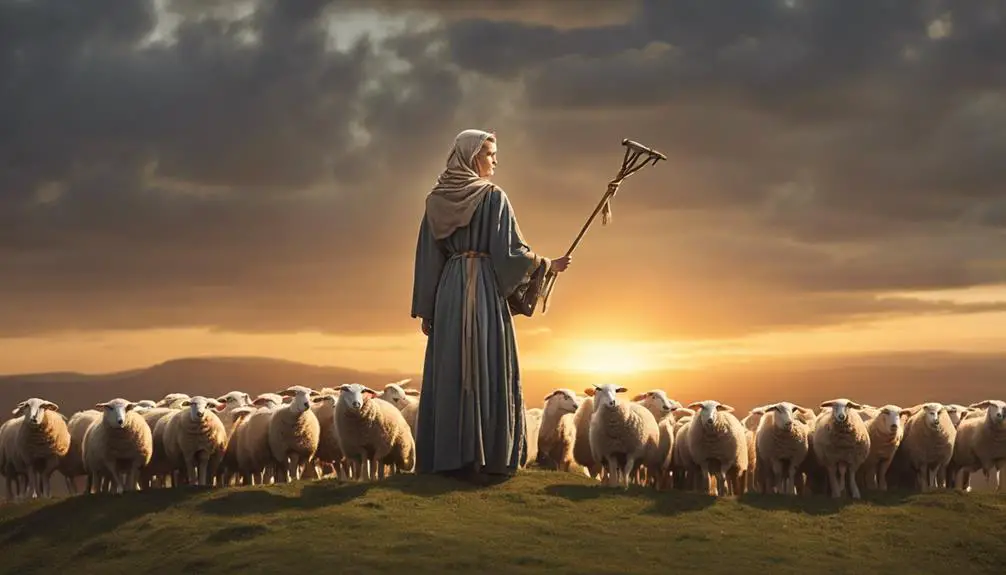
How can we extract lessons of faith and determination from the lives of these biblical shepherdesses? You can do so by drawing parallels with their spiritual endurance and divine encounters, and applying them to your own life. Their stories are replete with instances of unwavering faith and steadfast determination, often amid adversity.
Consider the shepherdess Rachel, she demonstrated spiritual endurance in her daily labors, facing physical hardships with an unyielding spirit. Her divine encounter with Jacob at the well may seem coincidental, but it's a testament to her faith, showing how God works in mysterious ways. Rachel's story embodies the principle of Galatians 6:9, “And let's not grow weary of doing good, for in due season we'll reap, if we don't give up.”
Similarly, the shepherdess Zipporah exhibited determination and faith when she circumcised her son, an act that saved her husband Moses' life. She shows us that faith sometimes necessitates bold, decisive action, even when it's uncomfortable or challenging. From these women, you can learn that faith isn't merely a feeling, but a steadfast commitment to God's promises, and determination is the tenacity to persist despite obstacles.
Impact on Biblical Narratives

Shifting our focus to the narratives themselves, you'll find that these shepherdesses didn't just embody faith and determination, they also played pivotal roles that significantly shaped the biblical stories they were part of. Their actions and decisions not only altered the course of events but also brought about profound changes in the gender dynamics of their respective stories.
In the cultural context of these biblical narratives, women were often relegated to the sidelines. However, the shepherdesses stand out as exceptions. They were active participants, using their agency to protect and nurture their flocks, and in turn, their communities. Their roles challenged and expanded the traditional gender expectations of their time.
Consider Rachel, a shepherdess who confronted and negotiated with Jacob, leading to a pivotal marriage that produced significant biblical characters. Then there's Zipporah, Moses' wife, who saved him by circumcising their son, showing her decisive action in a crucial moment. These narratives highlight the influence and impact of these shepherdesses, demonstrating their importance and reshaping our understanding of women's roles in the Bible.
In essence, the shepherdesses' actions and the roles they played challenge traditional gender norms and contribute to a richer, more nuanced understanding of the biblical narratives.
Frequently Asked Questions
What Was the Societal Perception of Female Shepherds During Biblical Times?
In biblical times, the societal perception of female shepherds was complex. Although largely patriarchal, the Bible features prominent shepherdesses, symbolizing strength and independence. The roles weren't strictly gender-based, and women could hold important positions.
This challenges typical biblical gender roles, suggesting a nuanced understanding of women's roles in ancient societies. They weren't just caregivers, but also contributors to the economy and societal structures.
Are There Any Specific Rituals or Practices Followed by Female Shepherds in the Bible?
There's no direct mention of specific rituals or practices followed by shepherdesses in the Bible. However, the shepherdess symbolism is significant in biblical interpretation.
You'd find that it often represents nurturing, guidance, and leadership. Remember, context is key when analyzing biblical texts.
You can't simply isolate these roles from the overall narrative and cultural setting. So, while there's no explicit ritualistic activity, their actions hold symbolic value.
How Does the Profession of Shepherding for Women in the Bible Compare to Other Jobs Women Had During That Period?
In comparison to other jobs women held during biblical times, shepherding was unique. As a shepherdess, you'd have significant influence, often working independently.
Unlike many other roles, you weren't confined to domestic tasks. This independence and the necessity to be resourceful and resilient made shepherding stand out amongst other biblical women's work.
Did Biblical Female Shepherds Have Any Distinct Roles or Responsibilities in Their Communities Outside Herding?
Yes, biblical female shepherds often held significant roles beyond herding. They wielded considerable women's influence in their communities, often serving as key figures in religious and social life.
The shepherdess symbolism portrayed them as nurturers and protectors. Their responsibilities often extended to the care of the entire community, reinforcing their importance and demonstrating their multi-faceted roles within their societies.
Are There Any References to Female Shepherds in Other Religious Texts Outside of the Bible?
In comparative theology, you'll find references to female shepherds in non-biblical religious texts. For instance, ancient Egyptian texts often depict women in shepherding roles. Likewise, in Hindu scriptures, you'll encounter narratives of pastoral women.
These examples, among others, provide fascinating insights into ancient feminism and the roles women played in various religious and cultural contexts. It's an engaging topic that you'll certainly enjoy exploring further.
Conclusion
In conclusion, you've seen how female shepherds in the Bible held significant roles, overcoming challenges with faith and determination. They've shaped biblical narratives in profound ways, teaching us timeless lessons.
These women weren't just background characters; they were pivotal, strong, and influential. Their stories are a testament to the power of women, reminding us that regardless of the era or circumstance, women have always been, and will continue to be, integral to the unfolding of history.

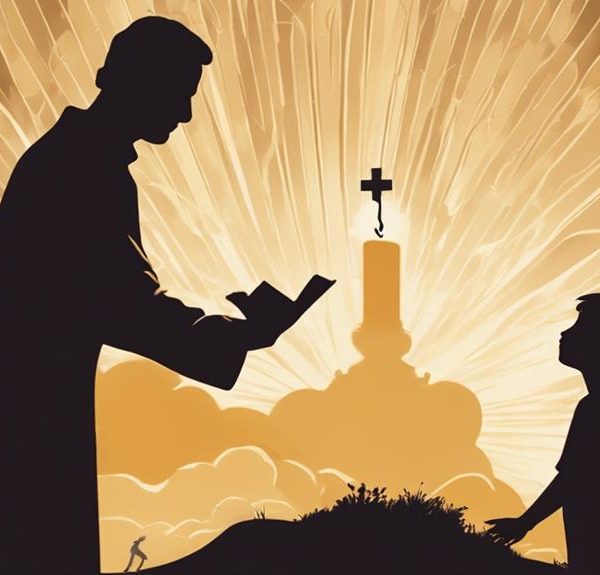

Sign up